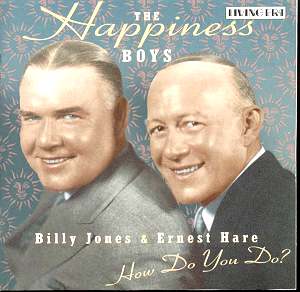 CD Reviews
CD Reviews MusicWeb
Webmaster: Len Mullenger
Len@musicweb.uk.net
[Jazz index][Purchase CDs][ Film MusicWeb][Classical MusicWeb][Gerard Hoffnung][MusicWeb Site Map]

The Happiness Boys - How Do You Do?
![]() LIVING ERA CD AJA
5628 [77:52]
LIVING ERA CD AJA
5628 [77:52]
Crotchet Budget price
Barney Google
Does The Spearmint Lose Its Flavour On The Bedpost Overnight?
Don't Bring Lulu. Down Yonder
Etiquette Blues
Henry's Made A Lady Out Of Lizzie
Hi Lee Hi Lo
Chop Suey A La Fox-Ee Trot-Ee
How Do You Do? How Do You Do?
I Can't Sleep In The Movies Any More
I Miss My Swiss My Swiss Miss Misses Me
I've Got The Yes! We Have No Banana Blues
If You Knew Susie
In The Little Red School House
Old King Tut - In Old King Tutenkhamen's Day
Sergeant Flagg And Sergeant Quirt
I'll Tell The Cockeyed World
She's The Sweetheart Of Six Other Guys
That Certain Party
Twisting The Dials
The Village Blacksmith Owns The Village Now
What Has Become Of Hinky Dinky Parlay Voo
Yes! We Have No Bananas (Billy Jones solo)
You Don't Like It - Not Much
You Tell Her - I Stutter.
The Happiness Boys; Billy Jones and Ernest Hare
rec. 1921-29
The Happiness Boys were Billy Jones and Ernest Hare, so named after Happiness Candy Stores; they’d previously been named after a sock firm, an oil company and - as The Tasty Loafers – a bread manufacturer. Advertising was alive and flourishing on early American radio, amongst whose ranks Jones and Hare were pioneers.
Jones, the tenor, was born in 1889, Hare, the baritone, six years earlier. Comedy and theatre claimed them early – Hare was even understudy to Jolson in Sinbad, a big local hit - and they were paired for a recording session in 1920. After that, though they did record independently, their greatest fame resided in their radio teaming. Their focus was New York, and station WEAF and then onto NBC in its earliest days. It was under the name of The Happiness Boys – assumed in 1923 – that they made the first of their voluminous collection of records; a figure of 4,000 is quoted, an astounding amount if true. At their peak they were amongst the biggest radio stars in America but the Depression began its worst and their careers gradually dwindled. Both died young and within a year of each other; Hare in 1939, Jones after a heart attack the following year.
These excellently transferred examples of their comedic talent span acoustic and early electrics from 1921 to 1929. Amidst the flotsam of the time you will certainly recognise songs that have entered the comedic bloodstream. Yes! We Have No Bananas is one, If You Knew Susie another and Does The Spearmint Lose Its Flavour On The Bedpost Overnight? a third. Lonnie Donegan revived this in the early 1960s substituting "chewing gum" for the unacceptably specific brand name. Talking earlier of flotsam Jones and Hare must have been an influence on the Anglo-Australian partnership of Flotsam and Jetsam, whose tenor and bass wit resembled the Happiness Boys in important though not universal respects.
The Happiness Boys ploughed some soil. They go down south in Down Yonder though Jones was born in New York and Hare in Norfolk, Virginia so this was an exotic linguistic jaunt for them. They do a stuttering song, a genre not nearly a popular as the Laughing Song but still ripe for some questionable gags. They were quick off the mark celebrating Carter and Carnarvon’s discovery of Tutenkhamen's tomb with a piece of cod-Egyptiana. They also embrace the Chinese vogue, dig slyly at nouveau riche blacksmiths and point the way to the new talkies. Their fear that you can’t fall asleep in the cinema now that the silents have gone has surely not been realised. There’s a brilliant piece of work on Twisting The Dials where a radio knob twiddle is reproduced with cleverly intercut results (weird conjunctions of popular and classical music, interference etc).
Their brand of humour is heard at its best here. Cannily selected it embraces a wide array of backing bands – including rinky-dink dance-bands grandly masquerading as orchestras, the galvanising banjo of Harry Reser and their regular pianist Dave Kaplan. I’ve happily plundered David Lennick’s notes for biographical details – his are the fine transfers as well.
Jonathan Woolf